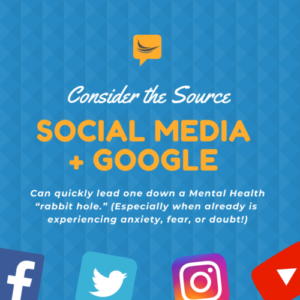
Consider the source of information.
In a society where we are inundated with information from the media, including all the advice from anyone with an opinion to share, it can be hard to know what to do. Google search has become a best friend, although it can quickly lead one down a “rabbit hole.” (Especially when already is experiencing anxiety, fear, or doubt!)
When it comes to topics related to beauty, health, and fitness, the internet has so much advice! Social medial platforms that are heavily based in images such as Instagram, Facebook, and TikTok can be a lot of fun to scroll through, but they can also become depressing when social comparison sets in. I can’t help but feeling self-conscious about my own thighs after watching “thigh gap” challenges on Tik Tok.
Disordered eating, substance misuse, relational distress, intrusive thoughts and attempts to regain control… these have only worsened for many who live with eating disorders, substance use disorders, posttraumatic stress disorder (PTSD), and obsessive-compulsive disorder (OCD). The daily stressors can begin to feel overwhelming and the advice on how to cope can vary greatly.
The voices of influencers can help break down stigma associated with mental health. Social media can help increase awareness, inspire, and motivate. There is a wealth of knowledge available
with so many great resources. One the other hand, misinformation about mental health can quickly spread. Family, friends, and groups may have good intentions; however, it is important to check the content with reliable sources.
Here are just a few good web resources that can provide more information about mental health:
https://www.cdc.gov/mentalhealth/
These are specialized for specific concerns:
Eating Disorders: https://www.nationaleatingdisorders.org/
Substance Use Disorders: https://www.samhsa.gov/find-help/disorders
Domestic Violence: https://www.thehotline.org/
PTSD: https://www.ptsd.va.gov/
OCD: https://iocdf.org/about-ocd/
Speaking with a mental health professional can help provide psychoeducation, effective treatment interventions, and appropriate referrals. Plus, there is an important relational component that many are missing. Coping during a global pandemic is not easy, and social isolation can make it more difficult to access supports. I am so grateful for options that increase access to services such as telehealth counseling services and online chat lines. At CARE Counseling, you get the same quality of services that you would receive from an office setting, but in the comfort of your environment. CARE Counseling accepts Medical Assistance and is in-network with all major insurance carriers. With same week appointments available, help is a click away.
Written By: Charlotte Johnson, MA, LPCC
We’re Here to help
Our wellness experts will be happy to take care of you. You can CLICK HERE to schedule an appointment now or call (612)223-8898.
Meet Clinicians
We’re united by our commitment to providing effective, relevant, and innovative mental health support at all stages of your journey. Click Here to find out more about who we are, where we come from, and how we live out CARE’s mission every day.
The professionals at CARE are actively collecting and creating resources to help with what you need. We’re Here for You.



